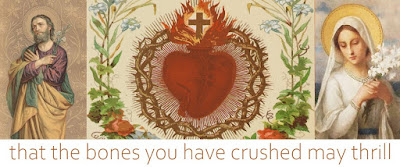This might be worth watching...
Courtesy of Catholic Encyclopedia, New Advent
'The life of Hildegard as child, religious, and superioress was an extraordinary one. Left much to herself on account of her ill health, she led an interior life, trying to make use of everything for her own sanctification. From her earliest years she was favoured with visions. She says of herself:
"Up to my fifteenth year I saw much, and related some of the things seen to others, who would inquire with astonishment, whence such things might come. I also wondered and during my sickness I asked one of my nurses whether she also saw similar things. When she answered no, a great fear befell me. Frequently, in my conversation, I would relate future things, which I saw as if present, but, noting the amazement of my listeners, I became more reticent."
This condition continued to the end of her life. Jutta had noticed her gifts and made them known to a monk of the neighbouring abbey, but, it seems, nothing was done at the time. When about forty years of age Hildegard received a command to publish to the world what she saw and heard. She hesitated, dreading what people might think or say, though she herself was fully convinced of the Divine character of the revelations. But, continually urged, rebuked, and threatened by the inner voice, she manifested all to her spiritual director, and through him to the abbot under whose jurisdiction her community was placed. Then a monk was ordered to put in writing whatever she related; some of her nuns also frequently assisted her.
The writings were submitted to the bishop (Henry, 1145-53) and clergy of Mainz, who pronounced them as coming from God. The matter was also brought to the notice of Eugene III (1145-53) who was at Trier in 1147. Albero of Cluny, Bishop of Verdun, was commissioned to investigate and made a favourable report. Hildegard continued her writings. Crowds of people flocked to her from the neighbourhood and from all parts of Germany and Gaul, to hear words of wisdom from her lips, and to receive advice and help in corporal and spiritual ailments. These were not only from the common people, but men and women of note in Church and State were drawn by the report of her wisdom and sanctity.
Thus we read that Archbishop Heinrich of Mainz, Archbishop Eberhard of Salzburg and Abbot Ludwig of St. Eucharius at Trier, paid her visits. St. Elizabeth of Schönau was an intimate friend and frequent visitor. Trithemius in his "Chronicle" speaks of a visit of St. Bernard of Clairvaux, but this probably was not correct. Not only at home did she give counsel, but also abroad. Many persons of all stations of life wrote to her and received answers, so that her correspondence is quite extensive. Her great love for the Church and its interests caused her to make many journeys; she visited at intervals the houses of Disenberg and Eibingen; on invitation she came to Ingelheim to see Emperor Frederick; she travelled to Würzburg, Bamberg, and the vicinity of Ulm, Cologne, Werden, Trier, and Metz. It is not true, however, that she saw Paris or the grave of St. Martin at Tours.'

'This might be worth watching' - I am sure you are right but unfortunately at the moment 'my computer says no!' (Tried the Gloria site too but no luck there either.)
ReplyDeletePope Benedict XVI offered St. Hildegard of Bingen as a role model for women theologians, praising the perspective that women bring to theological discussions.
ReplyDelete“Theology can receive a unique contribution from women, because they’re capable of speaking about God and the mysteries of the faith with a special intelligence and sensibility,” the pope said.
“I therefore encourage all those women who perform this service to do it with a profound ecclesial spirit, nourishing their own reflections with prayer, and looking to the great richness, in part still unexplored, of the medieval mystical tradition, above all that represented by luminous models such as Hildegard of Bingen.”
Laurence
"May the Holy Spirit enkindle you with the fire of His Love so that you may persevere, unfailingly, in the love of His service"
HILDEGARD OF BINGEN, letter to the Monk Guibert, 1176
I'm having trouble with the video too.
ReplyDeleteAlso www.catholic-bloggers.com seems weird but it worked through Father Ray's comments.
Wouldn't risk turning up at the drinks venue until this is verified. Could be just a bug.
Paranoia about the RC blogosphere is getting me down. I'm constantly wondering what is genuine.
Anyway Laurence, love Saint Hildegard and Julian of Norwich and Our Lady of course.
THE FUTURE IS FEMALE!
Was going to say ignore my comment as I can now see the video but you got there first.
ReplyDeleteAnn Marie - I decided to turn off my computer and when I turned it on again there was an update installed and the video played. However I have once again lost all the pictures on the parish blog - except for the papal flag which is still merrily flying!
Such a pity the trailer takes a typically secular, individualist line. 'She stayed true to herself' (not to God, you notice). 'She challenged Tradition, the Church etc'. Of course, who could support such things?
ReplyDeleteWhoever wrote this religiously illiterate guff really doesn't get it. I hope the film proves different.